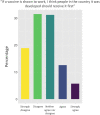Vaccine nationalism and internationalism: perspectives of COVID-19 vaccine trial participants in the United Kingdom
- PMID: 34666989
- PMCID: PMC8526520
- DOI: 10.1136/bmjgh-2021-006305
Vaccine nationalism and internationalism: perspectives of COVID-19 vaccine trial participants in the United Kingdom
Abstract
Background: Vaccine nationalism has become a key topic of discussion during the development, testing, and rollout of COVID-19 vaccines. Media attention has highlighted the ways that global, coordinated access to vaccines has been limited during the pandemic. It has also exposed how some countries have secured vaccine supply, through bilateral purchase agreements and the way pharmaceutical companies have priced, negotiated, and delivered these supplies. Much of the focus of this debate has been on the vaccine supply 'winners' and 'losers', but the voices of public opinion have been more limited.
Methods: We explore the concepts of vaccine nationalism and internationalism from the perspective of vaccine trial participants, using an empirical perspectives study that involved interviews with phase I/II COVID-19 vaccine trial participants in Oxford, UK. We surveyed and interviewed participants between September and October 2020 about their views, motivations and experiences in taking part in the trial.
Results: First, we show how trial participants describe national and international ideas about vaccination as intertwined and challenge claims that these positions are mutually exclusive or oppositional. Second, we analyse these viewpoints further to show that vaccine nationalism is closely connected with national pride and metaphors of a country's scientific achievements. Participants held a global outlook and were highly supportive of the prioritisation of vaccines by global need, but many were also pessimistic that such a solution could be possible.
Conclusion: Trial participants constitute an informed public group, with situated public expertise that the global community could draw on as an expert opinion. We argue that vaccine nationalism is strongly attached to national character and, therefore, it is more difficult for ownership of a vaccine to be though of as international.
Keywords: COVID-19; health policy; public health; qualitative study; vaccines.
© Author(s) (or their employer(s)) 2021. Re-use permitted under CC BY. Published by BMJ.
Conflict of interest statement
Competing interests: All authors except SV have worked or are currently working on the UK clinical trials of the SARS-COV-2 candidate vaccine; ChAdOx1 nCoV-19. AJP is the chief investigator of these clinical trials.
Figures
References
-
- Bollyky TJ, Bown CP. The tragedy of vaccine nationalism: only cooperation can end the pandemic. Foreign Aff 2020;99.
-
- Elbe S. Bodies as Battlefields: toward the medicalization of insecurity. Int Polit Sociol 2012;6:320–2. 10.1111/j.1749-5687.2012.00166_3.x - DOI
-
- Duke Global Health Innovation Center . Launch and Scale Speedometer [Internet], 2021. Available: https://launchandscalefaster.org/covid-19/vaccineprocurement
-
- GAVI . COVAX Explained [Internet], 2021. Available: https://www.gavi.org/covax-facility?gclid=CjwKCAjwm7mEBhBsEiwA_of-TPAPfN...
Publication types
MeSH terms
Substances
LinkOut - more resources
Full Text Sources
Medical

